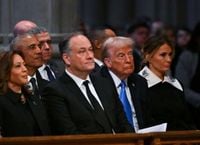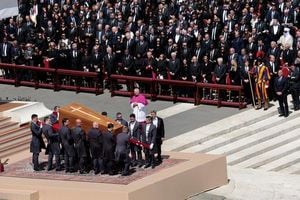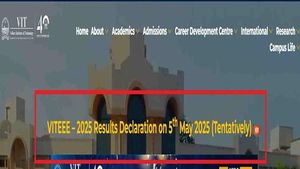In a surprising move that has drawn widespread criticism, former President Donald Trump has dismissed Doug Emhoff, the husband of Vice President Kamala Harris, from the board of the United States Holocaust Memorial Museum in Washington, D.C. The announcement, made public via Emhoff's post on the social media platform X on April 30, 2025, has sparked a debate about the politicization of Holocaust remembrance.
Emhoff, who was appointed to the museum's board by Trump's predecessor, President Joe Biden, stated in his post, "The memory of the Holocaust and Holocaust education should never be politicized. Making one of the worst atrocities in history a matter of contention is dangerous and dishonors the memory of six million Jews murdered by the Nazis." His comments reflect a deep concern regarding the implications of such political maneuvers on historical memory and education.
The dismissal comes as part of a broader trend under Trump’s administration, which has seen the removal of several high-profile Democrats from various boards and councils. Alongside Emhoff, Trump also dismissed other Biden appointees, including Ron Klain, Biden's former chief of staff, and Susan Rice, the former national security advisor to President Barack Obama. This pattern of dismissals has raised questions about the administration's intentions and its approach to bipartisan governance.
According to a report in the New York Times, Trump’s administration aims to replace these board members with individuals who are described as "steadfast supporters of the State of Israel." White House spokesperson Karoline Leavitt confirmed this strategy, stating, "President Trump looks forward to appointing new figures who will not only continue to preserve the memory of the victims of the Holocaust but also be steadfast supporters of the State of Israel." This approach has been interpreted by many as an attempt to align the museum’s leadership with a particular political ideology.
Emhoff's removal is particularly poignant given his role as the first "Second Gentleman" of the United States, a title he assumed when his wife was elected as vice president in 2020. He has been an outspoken advocate against antisemitism and has worked alongside Harris to promote awareness and education about the Holocaust. His commitment to these causes has only intensified in light of his recent dismissal.
In his statement, Emhoff expressed his determination to continue advocating for Holocaust remembrance, despite the political climate. He emphasized the importance of maintaining a nonpartisan approach to Holocaust education, asserting that it should transcend political divides. His comments resonate with many who fear that the current political landscape is increasingly weaponizing historical narratives for partisan gain.
The reaction to Emhoff's dismissal has been swift and critical. Former Congressman David Cicilline, a Democrat from Rhode Island who was also removed from the board, described the action as "deeply disappointing." He noted that the work of the museum has always been nonpartisan and is intended to provoke critical reflection on society's role in combating hatred and antisemitism.
Critics of Trump’s decision argue that politicizing the Holocaust undermines the very purpose of the museum, which is to educate the public about the atrocities committed during World War II and to honor the memory of its victims. Many in the Jewish community have expressed concern that such political actions could lead to a dilution of the museum's mission and a misrepresentation of historical facts.
This controversy is not isolated. Since taking office in January 2025, Trump has dismissed numerous officials appointed by Biden, further fueling tensions between the two political parties. In a related incident earlier this year, Trump dismissed several members of the board of the Kennedy Center and appointed himself as chairman, a move that has been criticized as unprecedented and indicative of a broader trend toward centralizing power within his administration.
Emhoff's removal from the Holocaust Museum board raises important questions about the future of such institutions and their ability to operate independently of political influence. As the nation grapples with rising antisemitism and other forms of hate, the role of educational institutions in promoting understanding and tolerance becomes ever more critical.
In the wake of these events, many are calling for a renewed commitment to nonpartisan education about the Holocaust and other historical atrocities. Advocates argue that the lessons of the past must be preserved and taught without the interference of political agendas. The importance of honoring the memory of those who suffered and died during the Holocaust cannot be overstated, and it is crucial that future generations learn from these historical injustices.
As Emhoff prepares to continue his advocacy work, he remains a prominent figure in the fight against antisemitism and for the preservation of Holocaust education. His commitment to these issues will likely resonate with many who share his concerns about the implications of political maneuvering on historical memory.
In conclusion, the dismissal of Doug Emhoff from the Holocaust Museum board serves as a stark reminder of the ongoing challenges faced by institutions dedicated to preserving historical memory in an increasingly polarized political landscape. The need for nonpartisan advocacy and education has never been more urgent, as society must confront the realities of its past while striving to build a more inclusive and tolerant future.






